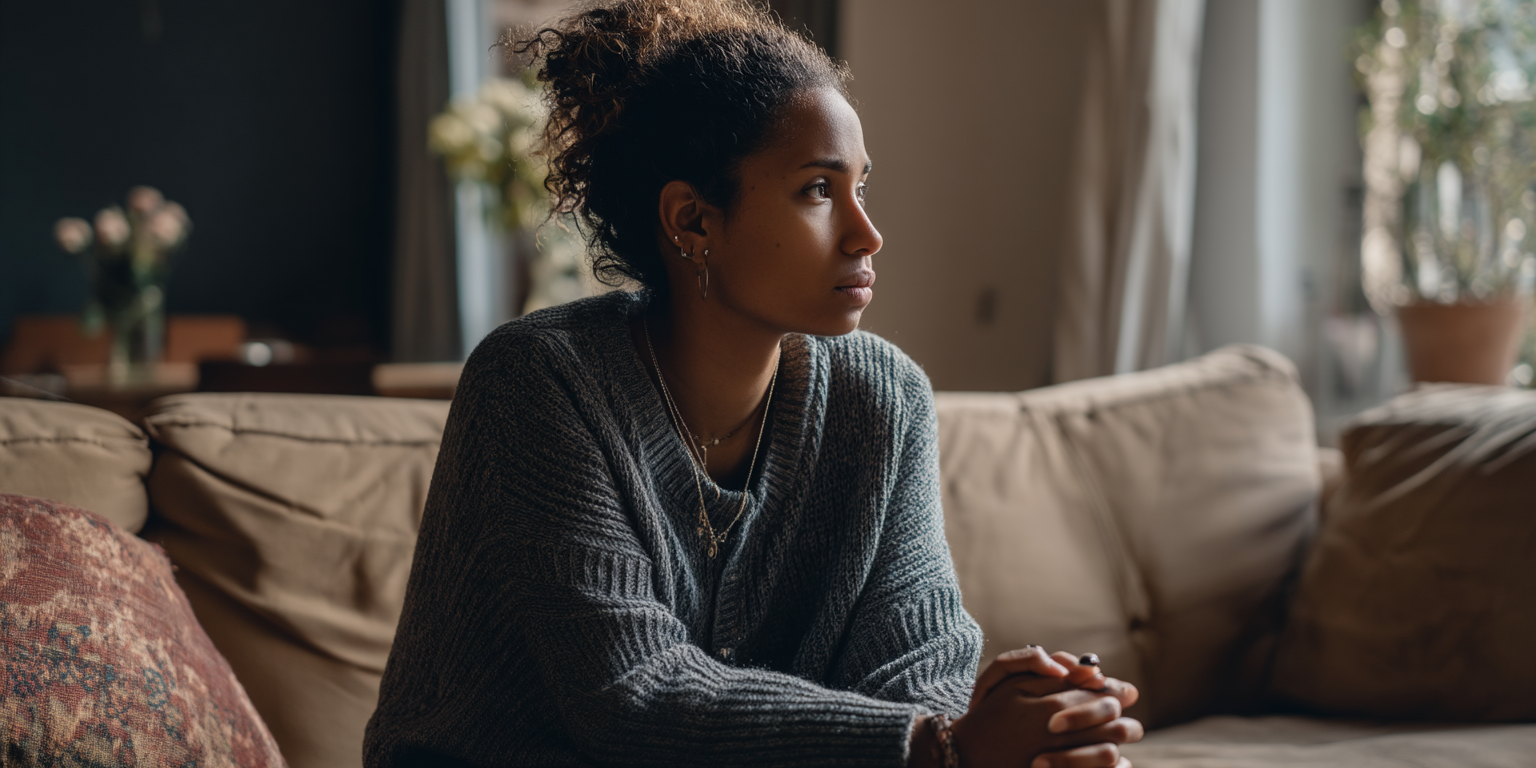5 Min Read
How Does Therapy Help Anxiety?
Whether you’re experiencing panic attacks, obsessions and compulsions, or everyday anxiety symptoms, it’s essential to know that you’re not alone. As the most common mental illness in the United States, anxiety disorders affect 40 million adults, or 19.1% of the population, every year, according to the National Institute of Mental Health (NIMH).

Working with a mental health professional can improve your mental health. For many anxiety disorders, psychotherapy is the most effective treatment. Psychotherapy can help you uncover the underlying causes of your worries and fears, learn how to relax, and develop healthier coping mechanisms and problem-solving skills. Essentially, therapy gives you the necessary tools to overcome anxiety and teaches you how to use them.
What types of therapy are used in the treatment of anxiety?
Psychotherapy—unlike anti-anxiety medication—treats more than just the symptoms of anxiety. Therapy’s self-reflective process helps people with anxiety disorders understand, identify, and transform their anxiety. If anxiety symptoms flare up, implementing healthy coping strategies can be critical.
Some of the types of therapy most commonly used in the treatment of anxiety include:
Cognitive-Behavioral Therapy
Cognitive-behavioral therapy (CBT) is the most widely used therapy for the treatment of anxiety disorders. CBT relies on the concept that our thoughts—not external events—affect how we feel, think, and behave. In other words, the situation you’re in doesn’t determine how you feel, but your perception of the situation does.
CBT addresses negative thoughts and behaviors in the way we look at the world and ourselves. Cognitive-behavioral treatment involves two main components:
- Cognitive therapy examines how your negative thoughts contribute to feelings of nervousness and anxiety.
- Behavior therapy examines how your behaviors and reactions in situations trigger anxiety.
Through a combination of homework assignments, goal-setting, group therapy, and structured therapy sessions, CBT aims to identify problematic thoughts and beliefs, challenge them, and replace them with healthier, more constructive thoughts and beliefs.
According to a meta-analysis by Hoffman et al., CBT is an effective treatment for a wide range of mental health conditions, including:
- Generalized anxiety disorder (GAD)
- Specific phobias
- Post-traumatic stress disorder (PTSD)
- Separation anxiety disorder
- Agoraphobia
- Social anxiety disorder (social phobia)
- Panic disorder
- Obsessive-compulsive disorder (OCD)
CBT is also an effective treatment for co-occurring, related disorders, such as mood disorders, including major depression and bipolar disorder.
Exposure Therapy
As the name suggests, exposure therapy exposes clients to feared objects or situations. Through repeated exposures, clients feel an increasing sense of control over feared situations, and excessive worry becomes more manageable over time.
Exposure therapy can be done in two ways. Therapists might ask clients to imagine feared situations, or clients may gradually confront feared situations in real life. Exposure therapy can be used alone or in combination with cognitive-behavioral therapy.
Psychodynamic Therapy
Psychodynamic therapy involves recognizing negative patterns of thinking and behaving that are rooted in past experiences. Therapists with a psychodynamic orientation typically use open-ended questions and free association, allowing clients to discuss whatever is on their minds.
During therapy sessions, clients and therapists work together to identify unconscious patterns of negative behavior. By bringing these associations to light, clients can learn to overcome problematic behaviors and feelings, according to the National Alliance on Mental Illness (NAMI).
Interpersonal Therapy
Interpersonal therapy (IPT) is a short-term treatment that addresses interpersonal issues in adolescents and adults.
During initial therapy sessions, you can expect your therapist to gather information about the nature of your mental health concerns and interpersonal experiences to identify negative patterns, such as social isolation, avoidance, or aggression. Ultimately, IPT treatment works to help clients understand their mental health issues and foster positive social interactions with others.

Find a Therapist to Help With Your Anxiety
Get personalized matchesDialectical behavior therapy (DBT)
DBT is heavily based on CBT but focuses on accepting uncomfortable thoughts, feelings, and behaviors instead of struggling with them. By coming to terms with negative thoughts and behaviors, clients can work with therapists to create a gradual treatment plan toward recovery.
DBT helps patients learn emotional and cognitive skills and successfully apply those skills to their daily lives. Generally, DBT focuses on tackling difficult emotions, such as excessive fear and nervousness. DBT can help people with anxiety disorders improve their capacity for emotional regulation and their ability to control emotions.
Complementary Therapies for Anxiety Disorders
As you explore your anxiety disorder in talk therapy, you may also want to experiment with complementary strategies to help manage stress levels and improve your mental health. Some complementary therapies that can help reduce anxiety symptoms include:
- Exercise: Taking care of your physical health is just as important as your mental health. Research shows that regular exercise can provide significant relief from anxiety symptoms. To achieve the maximum mental health benefit, set aside one hour for aerobic exercise three to five days a week.
- Healthy lifestyle changes: Eating a balanced diet, getting enough sleep, avoiding caffeine and nicotine, and setting aside time for your favorite daily activities can help manage the symptoms of anxiety.
- Mindfulness and relaxation techniques: Mindfulness meditation, yoga, and progressive muscle relaxation, can help reduce anxiety and improve your mental health.
- Support groups: Many people with anxiety disorders find support groups to be a beneficial component of their treatment plan. Support groups can help adolescents, adults, and older adults feel less alone, fight social anxiety, and connect with people in similar situations. Research has shown that support groups can be especially helpful for those with posttraumatic stress disorder.
Before incorporating herbal supplements or vitamins into your treatment plan, make sure to talk to your primary care physician to rule out potential interactions with benzodiazepines, tricyclic antidepressants, and anxiety medications.
What about anxiety medication?
While talk therapy is typically used as a first-line treatment for anxiety disorders, anti-anxiety medications can help treat anxiety’s physical symptoms to help individuals function and feel better. However, it’s essential to keep in mind that anxiety medications cannot address the underlying emotional and psychological causes of anxiety or help people learn different ways to cope with anxiety symptoms.
Some common types of medications used to treat anxiety disorders include:
Serotonin-norepinephrine reuptake inhibitors (SNRIs) are antidepressants that influence both serotonin and norepinephrine levels in the brain. Common SNRIs used to treat anxiety disorders include Duloxetine, Cymbalta, and Venlafaxine.
Selective serotonin reuptake inhibitors (SSRIs) are antidepressants that boost serotonin production in the brain. Common SSRIs used to treat anxiety disorders include Paroxetine and Sertraline.
Anti-anxiety medications, such as Xanax, Klonopin, Lorazepam, Buspirone, can help manage physical symptoms.
Unwanted side effects, such as restlessness, irritability, headaches, and nausea, are commonly associated with anxiety medication, and responses to medications vary between individuals. It’s crucial to work closely with your primary care provider, psychologist, and psychiatrist to monitor changes in mood, behavior, and other specific symptoms to find the right medication.
For people with intense panic attacks, obsessions and compulsions, or intrusive thoughts, medication may be essential to living a fulfilling life.
Final Thoughts
Sometimes, anxiety symptoms can become overwhelming, and intense fear and nervousness can interfere with your daily life. If you’re struggling with excessive anxiety, it’s essential to place your mental health in the right person’s hands.
To find the right therapist, reach out to a mental health professional through WithTherapy. We’ll connect you to a mental health provider you feel comfortable with, regardless of your personal preferences and requirements.
One of the experienced mental health providers on the WithTherapy platform will help you explore your treatment options, find new ways to manage your anxiety symptoms, improve your quality of life, and navigate your mental health concerns.
Find a Therapist to Help With Your Anxiety




